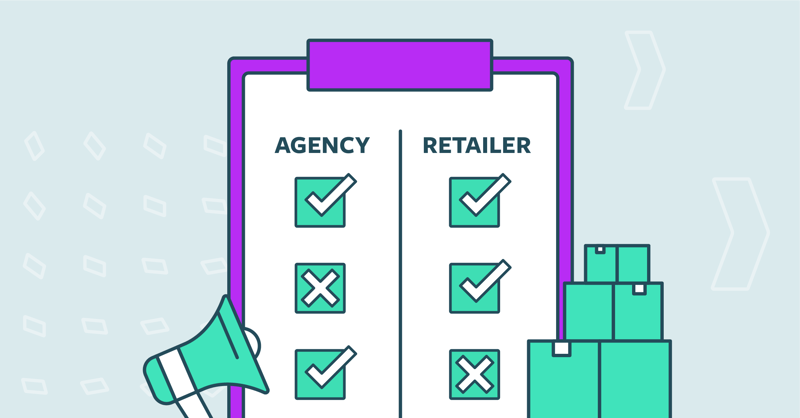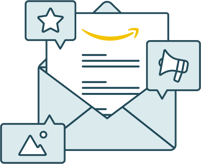
Over the past few years alone, the popularity of Amazon and online shopping skyrocketed (44% growth YoY in the U.S.) due to the impact of COVID-19 on consumer habits, especially in these rapidly growing Amazon categories. But the trend toward online shopping started long before the pandemic hit, and it isn't going away any time soon. If you’re a brand owner looking for ways to take advantage of the sheer opportunity Amazon and ecommerce as a whole hold for your business, you've got a lot of options to choose from.
For brands who simply don't have the time, resources, or expertise to fully manage their own marketplace efforts, there are two main solutions available for you:
To help you decide which one is the best fit for your brand, we'll compare and contrast the two and take a detailed look at the pros and cons of each option. (If at any point you’d like to connect and talk through your options further, here’s where to find us.)
When you work with an Amazon Retailer, essentially, you sell your products in bulk to a third-party seller (or sometimes multiple sellers) who will then resell those products on the Amazon marketplace on your behalf. When it comes to Amazon, brands that sell through a retailer can partner with Amazon directly (first-party or 1P, selling via Vendor Central) or with a third-party seller (3P, selling via Seller Central). Learn about their key differences in our blog post, Amazon 1P vs 3P.
Pros of selling Wholesale on Amazon
Cons of selling Wholesale on Amazon
Is selling Wholesale on Amazon the right choice for you?
If you’re looking to offload all Amazon responsibilities, selling products to an Amazon retailer (either 1P or 3P) offers a lot of advantages. However, and this can’t be stressed enough, it is essential to find a transparent and reliable third-party seller whom you can trust with your brand. You also need to understand the potential risks that come with handing that much control to an unknown retailer—be sure to do your research before giving them the keys.
An even better scenario is selling to a single third-party seller who can really approach your brand as a whole on the marketplace (and perhaps help you expand into others) by tackling end-to-end marketing, SEO, creative, advertising, logistics, and more. Here are a few case studies and videos that explain why a single, experienced 3P seller should be a key consideration if you choose to sell Wholesale, or if you are currently selling Wholesale to multiple sellers on the marketplace:
Working with an Amazon PPC agency or full-service consultant is a lot like hiring a marketing firm or working with a consultant: You retain full control of your brand’s product listings, logistics, and presence on Amazon. But, working with an agency means you’ll have a dedicated team of experts to help make decisions and guide you through every aspect of your Amazon business—and depending on who you work with, access to this team can cost much less than if you were to hire a full-time employee internally. For sellers who lack experience and resources, an Amazon agency can take over creating, optimizing, and executing product listings and Storefronts, an effective Amazon ads strategy, and more so you can handle all other business needs.
Pros of an Agency partnership
Cons of an Agency partnership
Is an Amazon Agency partnership the right choice for you?
Before making a decision on whether or not you should partner with an Amazon agency, ask yourself or your team the following questions:
If your answers to any of the above is no, an Amazon agency is the right choice for you. If you’re still having trouble deciding if Agency is the right way to go, read some helpful case studies, resources, and interviews with fellow brand owners here:
After reading all of this through, you might be one of the brave souls thinking to yourself: Should I just forgo any type of partnership, agency or wholesale/resale, and tackle it all myself?
If you have the time, expertise, and motivation to build a profitable presence for your brand on Amazon, selling yourself is obviously the best way to limit expenses and keep your profit margins high. For many brand owners, though, this simply isn't an option. Doing all that’s required to succeed on Amazon while still managing all the other elements of your business is a tall order, and even if you feel up to the challenge—you still might be missing out on growth opportunities that an experienced seller or agency who is constantly testing and executing on Amazon can offer.
If you’re feeling overwhelmed, frustrated, or you’re not happy with your current Amazon sales, product listing research/SEO, or advertising performance, why wouldn’t you seek change?
At SupplyKick we offer two types of partnership:
Want to discuss your Wholesale and Agency options further? Reach out to get a conversation started with our team. To stay connected with the latest Amazon news, trends, results, and insights, be sure to sign up for our newsletter.
Lorem ipsum dolor sit amet, consectetur adipiscing elit


Sign up to receive our newsletter for growth strategies, important updates, inventory and policy changes, and best practices.
These Stories on SupplyKick
For press inquiries, please contact Molly Horstmann, mhorstmann@supplykick.com